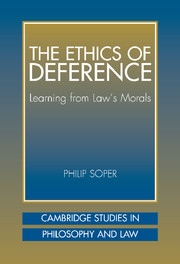5 - The Puzzle of Promise
Published online by Cambridge University Press: 18 December 2009
Summary
Introduction
Thus far, I have argued that law does not claim that subjects have reasons to defer to its judgments. But a central question for political theory has always been whether subjects do in fact have such reasons – a question typically posed by asking whether there is a prima facie obligation to obey the law. In Part II, I defend an affirmative answer to the question but do so indirectly. Instead of beginning with the question of political obligation, the next two chapters examine in turn two standard paradigms of obligation – promises and fair play – in order to show how these paradigms are themselves better understood when re-presented as examples of deference. The analysis of these two chapters will then be extended to the question of political obligation.
Two reasons justify starting with the problem of promissory obligation. First, political theory often assumes that political obligation could be established if only one could demonstrate actual or implied consent to the state. Most consent theorists, accordingly, focus on the kinds of actions that can plausibly be said to show consent. In this chapter, I argue that the implicit priority thus accorded to consent or promise is unwarranted because the difficulties of explaining why and how promises obligate are almost exact analogues of the difficulties that attend attempts to defend political obligation. Two consequences, one negative and one positive, result.
- Type
- Chapter
- Information
- The Ethics of DeferenceLearning from Law's Morals, pp. 103 - 139Publisher: Cambridge University PressPrint publication year: 2002



